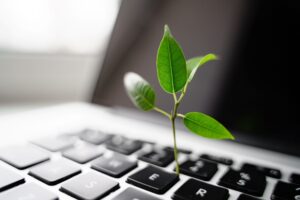Greening the economy, greening jobs, greening skills. Whether the starting point is an ecological concern (climate change, environmental protection, etc.) or an economic one (energy prices, increasing scarcity of resources, investor confidence, etc.), the trend towards greener organisations is continuing (CSR initiatives, energy efficiency, etc.). It is also affecting employees, who are keen to display skills that are in tune with the market.
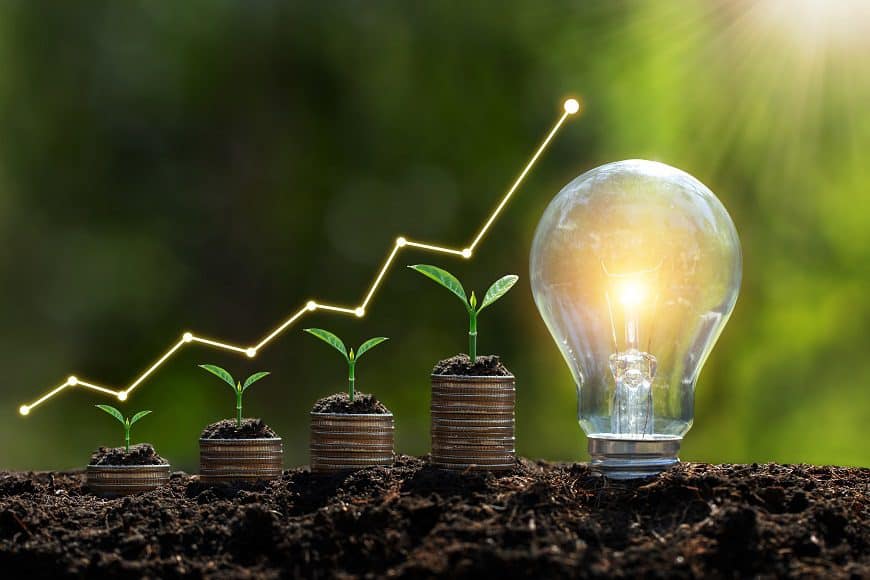
Nearly two out of three professional and managerial staff believe that the ecological transition will have a major impact on their jobs. This is the conclusion reached by APEC in a recent study on the employment challenges facing professional and managerial staff in 2024. (special edition, February 2024). The organisation also highlights a paradox:
Only just over one in four recruiters envisage a similar impact on their sector of activity, and less than one in five on their own company.
At the same time, a large majority of managers would not consider joining a company whose activities are harmful to the environment.
It's a big gap, which shows that organisations are evolving more surely under the impact of regulations.
"Regulations are a powerful lever for the ecological transition. They are forcing professions and activities to change", notes APEC. "Reducing energy consumption and taking into account the life cycle of products and services are the main actions underway. Greening is changing the way we work and the way we do business. As a result, when they are looking for managers, companies are not hesitating to express the need for skills that have a positive impact on the environment. (APEC study - Ecological transition - The greening of executive jobs is underway - September 2023).
These considerations are in line with those of the European Centre for the Development of Vocational Training (Cedefop), which has been working "for over 10 years on the transition to a greener, more sustainable economy and its implications for vocational training".
This ecological transition means that workers at all levels of qualification need skills and training.
Cedefop
On the one hand, jobs specific to the environment are developing: risk managers, environmental managers, QSE (quality, safety and environment) managers. On the other hand, existing professions need to be upgraded to incorporate the environmental dimension. The greening of skills can therefore be observed in various sectors: purchasing, waste management, digital technology and marketing. Companies, for their part, are facing a number of challenges: anticipate skills needs, make employees aware of the need for training, adapt their training policy.
So what are the skills that employees need to develop as a priority? What training courses should they take? ORSYS's training experts take a sector-by-sector look!
In summary
- Energy efficiency to support the ecological transition
- Ecological transition: carbon reduction through purchasing
- The ecological transition imposes major constraints on logistics
- Better management of waste with a view to the circular economy
- CSR, an opportunity for change to benefit your company
- Ecological transition: what's new in marketing?
- Responsible IT: ecological transition in sight!
- Ecological transition: HR at the service of widespread greening
- Green finance?
Energy efficiency to support the ecological transition
Suffered or chosen, the energy sobriety is now a factor at every stage of corporate decision-making. The explosion in energy prices has brought back into focus the need to do more with less," explains Bertrand Coupet, a specialist in low-carbon strategies. But how do we go about it?
1/ Drawing up a carbon assessment and associated low-carbon strategy
2/ Implement flow micromanagement
3 / Adopting an ISO 50001 approach to energy management
4/ Reflect on the company's raison d'être and business model
5/ Implementing the functionality economy and eco-design of products
6/ Raise awareness among employees
These are all areas in which we can invest to develop our employees' skills.
And to take things further, some companies may turn to a specialist in energy issues: the energy manager.
Energy manager: what skills do you need?
Key profession in energy managementEnergy managers play an essential role in optimising energy efficiency and reducing companies' carbon footprint. Against a backdrop of soaring energy prices and growing awareness of environmental issues, the energy manager now occupies a strategic position. It enables organisations to achieve their sustainability and profitability objectives while complying with their regulatory obligations. What skills do you need? These include knowledge of energy systems, thermal and mechanical processes, the life cycle of buildings and their assessment standards (HQE®, BREEAM, WELL, LEED), mastery of ISO standards, project management techniques and technical programming and calculation languages (Python, MATLAB, etc.).
Ecological transition: carbon reduction through purchasing
Buyers are on the front line when it comes to reduce carbon footprint of their company. This is the conviction of Martine Pallot, evaluator of the "Responsible Supplier Relations and Purchasing" Label. To date, they have already contributed to reducing energy consumption, shifting the energy mix towards renewable energies, giving preference to electric vehicles when renewing fleets, and supporting green IT initiatives.
Developing "supplier capital" skills
To go further, they must also take into account CO2 providers. This means developing skills in supplier capital. Buyers need to be able to communicate, share the issues, develop a supplier relationship based on listening, trust and cooperation. In practical terms, this will enable them to better support suppliers in quantifying their emissions, defining reduction targets and implementing low-carbon strategies.
Training in responsible purchasing
Decarbonising purchasing is also one of the priority actions of the responsible purchasing approach. For Yann Le Coz, expert and trainer in responsible purchasing, this is a major challenge for the largest companies. since the publication of the BEGES decree. The decree of 1 July 2022 on greenhouse gas emissions assessments has extended the scope of the assessment to include significant indirect emissions. A company's Scope 3 greenhouse gas (GHG) emissions often represent more than 60 % of its emissions.
Carrying out a carbon audit is the first stage. This makes it possible toidentify its main GHG emission factors and draw up an action plan to reduce them in the medium term. In this way, buyers can promote suppliers who have made the most progress in reducing GHG emissions. More specifically, as part of the development of a new product as part of an eco-design approach.
The ecological transition imposes major constraints on logistics
On an environmental level, the logistics constraints - particularly e-commerce - and are getting tougher, both socially and legally," warns Julien Monterisi. For this e-commerce logistics specialist, we need to rethinking last-mile logistics. In other words, to be able to provide city-centre or urban logistics. With the gradual ban on combustion engines in low-emission zones (LEZs), logistics operators are having to adapt.
On the one hand, this requires them to greening their fleets with electric vans and cargo bikes. And why not invest in small delivery robots, as in Shanghai and London? But, of course, developing a large fleet of adapted vehicles increases the cost of the last kilometre.
An additional difficulty: the new regulations mean that there is an increased need for wide variety of standards applicable in the field. Over and above the overall framework, each local authority is free to organise its implementation as it sees fit. This is the new challenge for transport operators, who are subject to different constraints depending on the towns they deliver to.
On the other hand, e-commerce logistics must rely more and more on the following small logistics platforms in townas close as possible to the recipient.
What are the priority skills to be strengthened? Purchasing and fleet management, regulatory monitoring and the acquisition of expertise in automated storage.
Better management of waste with a view to the circular economy
"Extract, manufacture, consume, throw away" sums up the dominant linear economic model. Its negative impact on the environment is now indisputable. At the same time, certain resources are in short supply: wood, building materials, paper, aluminium, vinyl, wheat and semi-conductors. Ecological and economic issues are converging until a consensus is reached: the circular economy must be the pillar of a new project for society. So argues Catherine Viale, consultant and trainer.
The circular economy at the service of the ecological transition
The circular economy consists of producing goods and services in a sustainable way by limiting the consumption and wastage of resources (raw materials, water, energy) and the production of waste. This requires rethinking every stage in the production of a goodto delivery to the customer. Very often, this means developing employees' skills through training. In a variety of areas.
Prioritising skills
The priority will be to developing skills in waste management. The challenge? To define and implement the "economically acceptable" organisational and technical means of achieving a level of management n-1 for all waste. The idea is to proceed step by step towards reducing waste at source. To achieve this, skills in project management will prove very useful.
The preferred waste treatment hierarchy
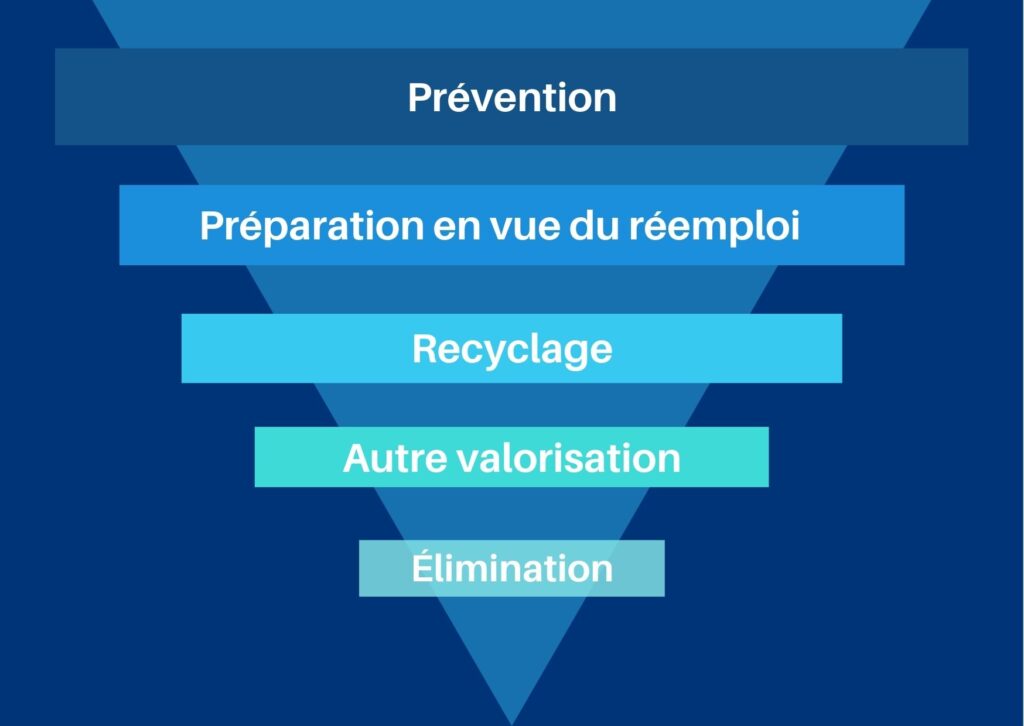
CSR, an opportunity for change to benefit your company
The environment is one of the three pillars of CSR (Corporate Social Responsibility). Voluntary approach by companiesCSR has a number of advantages: it reassures investors, boosts the employer brand, helps manage costs and risks, etc. But success depends above all on commitment. The commitment of a working group that needs to be motivated and "on board".
"Before saying what the company is going to do or how it is going to do it, it is necessary to explain why the company is going to do it," says Hoël Beau, CSR trainer, facilitator and consultant.
This will require solid skills in communication, change management and collective intelligence. The key point? Avoid a top-down strategy!
"The best ideas are not those that are written down on paper, but those that are brought to life by the teams", stresses the expert.
- Training Implementing a CSR approach
A cross-functional project team
Developing an environmental policy requires companies to be willing, to invest over the long term and to commit to pragmatic implementation," adds Catherine Viale. The success of the approach depends on a cross-functional project team: HR, communication, production, purchasing, etc. project management skills are therefore essential. In particular, you need to master the sprint approach or the PDCA wheel (plan, do, check, act), also known as the Deming wheel.
Ecological transition: what's new in marketing?
More sustainable and responsible marketing
Why build a sustainable marketing strategy? One of the reasons is for brands to adapt to changes in consumer behaviour, as awareness of environmental issues grows. Once the decision has been made, the next step is to structuring the approach to avoid the trap of goodwashing. For Clarisse Popower, an expert in responsible digital marketing, the roadmap for a sustainable and responsible marketing strategy through 5 steps.
1/ Determining its raison d'être and brand manifesto
2/ Choose a status that correlates with your activity (company with a mission, association, cooperative, SSE)
3/ Define a marketing mix that is consistent with the brand's raison d'être
4/ Mobilising all the company's stakeholders
5/ Be consistent when marketing products or services
Among the skills to be developed, communication ranks high. These include reinventing a responsible communication both in substance and in form.
Incorporating the circular economy into your marketing strategy
We now have to do more and better with less," stresses Clarisse Popower. The challenge for companies is not only to follow more responsible practices, but also and above all to devise more virtuous models to move towards sustainable consumption patterns. In other words, moving from a linear to a circular economy.
But how do you go about it? Rethink your value proposition to move towards a more viable model, through more sustainable consumption patterns, is a necessity. More and more companies are exploring new business models based on the principles of responsible production and consumption. It's up to each company to find its own model. Or take inspiration from more sustainable business models or marketing strategies inspired by the circular economy. For example: perma-business, the functionality economy, rational consumption, industrial and local ecology, sustainable or local sourcing, eco-design. These are all changes that will require upgrading knowledge and skills in a variety of areas: change management, project management, responsible purchasing, eco-design, etc.
Responsible IT: ecological transition in sight!
The question of responsible IT purchasing is set to become increasingly prevalent in businesses," points out Jean-Anaël Gobbe, a digital services quality specialist specialising in green IT.
Raising employee awareness of the importance of digital sobriety
A responsible IT purchasing policy is at the heart of a CSR approach and is based on digital sobriety. That's why, in addition to IT and purchasing skills, you also need to develop internal communication skills to encourage employees to use digital resources more responsibly.
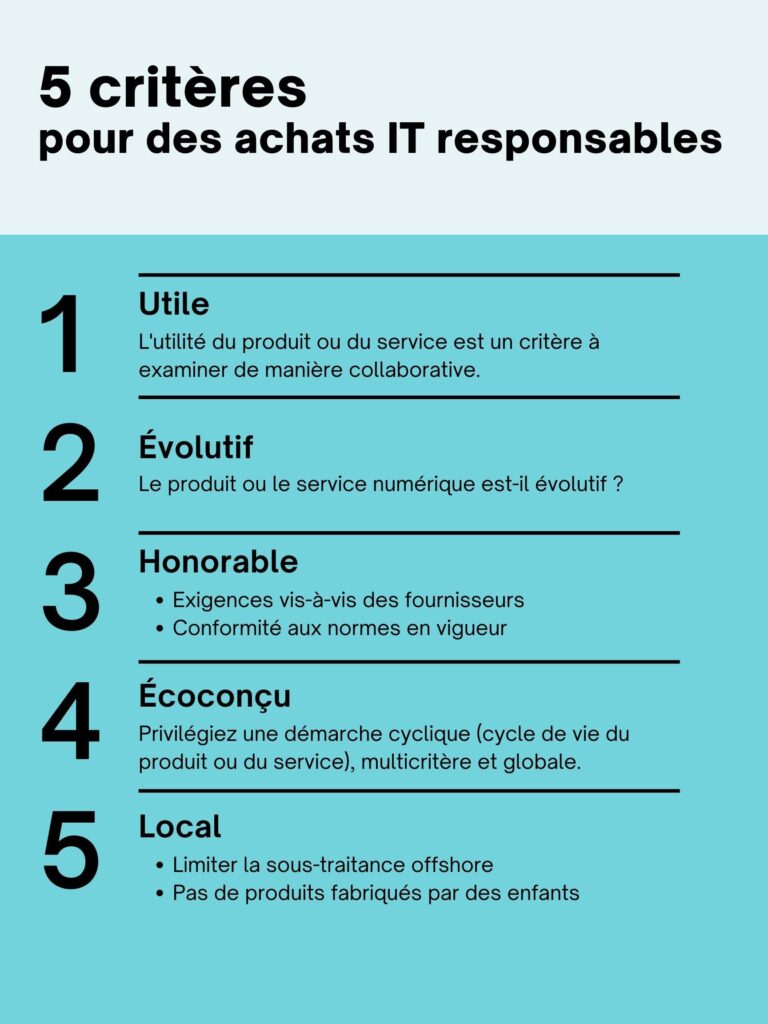
- Training Responsible IT purchasing
Optimizing your code, an environmental issue
Beyond the question of hardware and software purchases, reducing the impact of digital technology on the environment also depends on the design of digital services. It is therefore essential to developing skills in eco-design to design digital services that consume as little energy as possible.
- Training Ecodesign of digital services
Ecological transition: HR at the service of widespread greening
As evidence of the drive towards a generalised greening of skills, training decision-makers are also being encouraged to anticipate the consequences of the ecological transition on professions, jobs and skills within the company. This is one of the impacts of the "climate and resilience" law of 22 August 2021.
When the ecological transition impacts the training function...
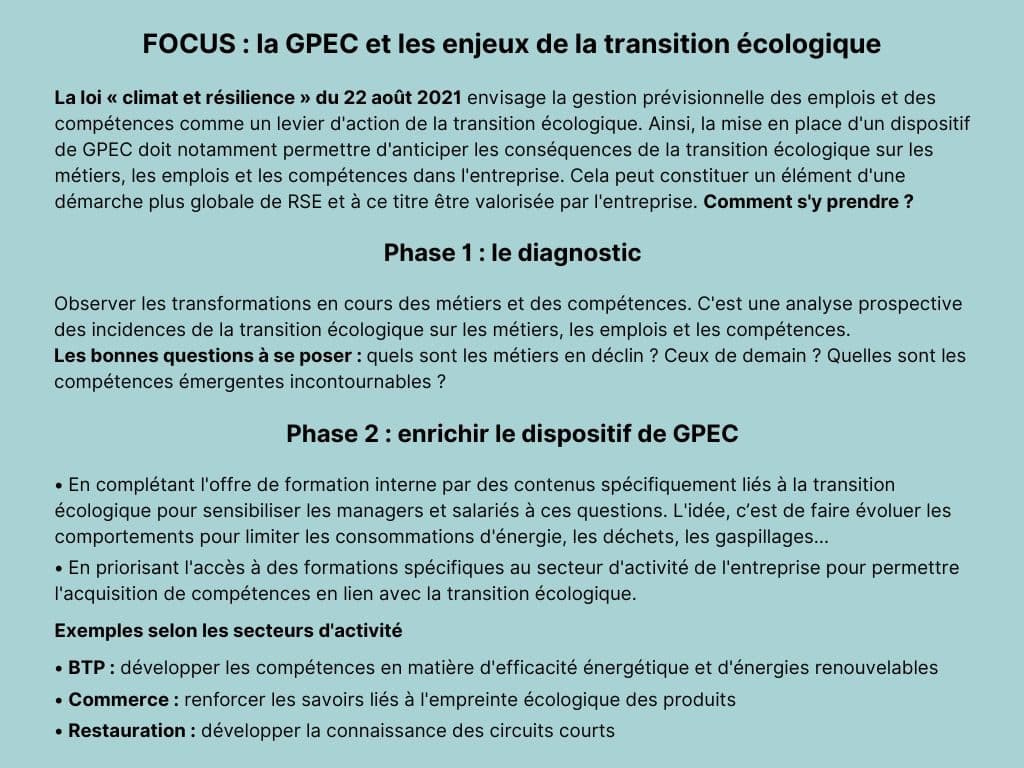
[Read also the article]
- Training Training management
... and the entire HR function
Training, social dialogue, recruitment, employer brand... the entire HR function is affected in its day-to-day work.
This involves in particular strengthening HR communication skillsWhether it's a question of attracting or retaining talent. This is precisely the strength of HR marketing managerThis is an emerging profession.
[Read the job description]
But you can also choose to develop these skills in your recruitment staff. The first step will be to train in content management tools (CMS) and graphic design software (DTP). Other courses will enable them to develop solid writing skills, acquire public speaking techniques and master the methods and tools of project management.
HR and CSR communication: the climate mural
To raise awareness of climate change among employees and reinforce the company's CSR approach, HR departments have a number of tools at their disposal new tool: the climate fresco.
[Read the article]
Climate fresco: raise your employees' awareness and strengthen your CSR approach!
[See the training]
This immersive and educational approach enables participants to gain a better understanding of the challenges of climate change. It also reinforces their commitment to the environment and encourages them to become more involved in their company's CSR strategy.
1 deck of cards
4 to 8 players
3 hours
1 facilitator
"To make a success of a CSR approach, it is crucial to build on a common understanding within the company", stresses Bérangère Leyritz, a specialist in digital responsibility and moderator of the climate fresco for ORSYS.
Towards environmental social dialogue?
The "climate and resilience" law has also led to a greening of skills in social dialogue within companies. The Social and Economic Committee (CSE) must be informed and consulted on the environmental consequences of measures affecting the organisation, management and general running of the company. As a result, environmental impact issues are set to play an increasingly important role on its agenda, as the following points out The world. Although they do not have decision-making powers, the works councils are seen as a counterweight. But how can this be done without additional resources? Encouraging the company to carry out a carbon audit, to train employees in digital responsibility or to direct employee savings towards environmentally-friendly funds are just some of the avenues to be explored. HR managers and elected representatives will therefore benefit from developing their skills in environmental law. It will also be necessary create and supply the BDESE correctly (economic, social and environmental database).
- Training Social dialogue
Green finance?
The world of accounting and finance is also adapting. New regulations, new skills requirements... You now need to master :
1 - The extra-financial reporting, driven by the CSRD (corporate sustainability reporting directive) to come into force at the beginning of 2024
[Read the article]
CSRD Directive: what impact will it have on your company? How can you prepare for it?
[See the training]
2 - The environmental management control
3 - The CARE accounting (comprehensive accounting in respect of ecology)
- Training Finance and environmental issues
To remember: all company functions are concerned by the need to upgrade skills to adapt to the ecological transition. It is essential to involve all decision-makers and managers in order to secure the structural stages of the process. Liaisons must also be identified in all departments to raise awareness and support all employees in changing their practices. Finally, it's important to remember that the success of a large-scale project also depends on employee training!


